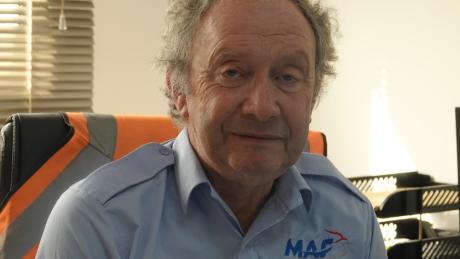
Liberia’s Civil Aviation Authority has conducted its inspection of Mission Aviation Fellowship operations in the country. Alan Sully, MAF temporary country director in Liberia, shares the importance of maintaining high standards.
Story by Rachel Gwole George
While MAF’s air operations received a positive assessment from the Liberian Civil Aviation Authority (LCAA), the outcome means more than just a tick of approval.
Alan Sully, MAF’s temporary country director in Liberia, expressed satisfaction with the results, but said the report card underpins the team’s passion to use aviation to serve isolated communities.
“There is a need to prove to the country’s civil aviation authorities that we are competent and safe to fly,” he said.
Liberia has a lack of reliable roads away from the coastal strip. This means, particularly during the rainy season, any travel can be long and arduous. So being approved to fly passengers to remote communities is important.
“The use of our aircraft means that passengers we fly not only arrive at their destinations significantly sooner but also more refreshed to carry out their tasks,” said Alan.
There is a need to prove to the country’s civil aviation authorities that we are competent and safe to fly.
“At present most of the destinations we fly to are grouped along the coast, but many inland airfields exist. These airfields have not been used for some time and most require rehabilitation. Gaining the trust of the aviation authority will allow us, with the help of partners, to reopen many of these airfields and make our ministry much more wide-ranging and effective.
“Post this year’s inspection, the LCAA allowed us to fly during the weather conditions thus allowing us to fly on more days than we could in the past thus making out flying more efficient and improving our ministry.”
The inspection process involved a thorough assessment with LCAA inspectors taking part in MAF’s flying activities, evaluating key aspects of the organisation
“The aviation authorities like to see on an annual basis how well we do our jobs,” Alan explained.
“They observed how we treat our passengers, look at the way that we fly our routes, and give us feedback on how well they believe we are doing our jobs.”
MAF Liberia was also tested on engineering standards and the training of its operational staff.
“MAF received exceptionally good feedback which allows the team to continue its vital mission of providing safe and reliable air transport to remote communities in Liberia,’’ Alan added.
Captain Reginald Phillips, Assistant Director for Flight Operations at the Liberia Civil Aviation Authority (LCAA), has worked closely with MAF over the past six years and was able to give a successful report.
“MAF consistently meets all safety requirements, and we collaborate during inspections to ensure that their aircraft are airworthy and pilots properly certified,” he said.
MAF consistently meets all safety requirements.
The assessor noted MAF’s ability to transform the delivery of aid, healthcare, and supplies to remote regions, where travel by land can take days, while MAF flights reduce the journey to under two hours.
“MAF Liberia service is a great benefit, especially in reaching isolated areas quickly,” he added.
Despite the challenges, MAF’s pilots display high levels of professionalism. Captain Phillips said Kenyan pilot Amos Nyongesa Simiyu, who has recently begun working in the programme, had performed well.
“I have been impressed with the professionalism of their newest pilots, during a recent inspection flight, the pilot followed all procedures and operated safely and efficiently,” he said.